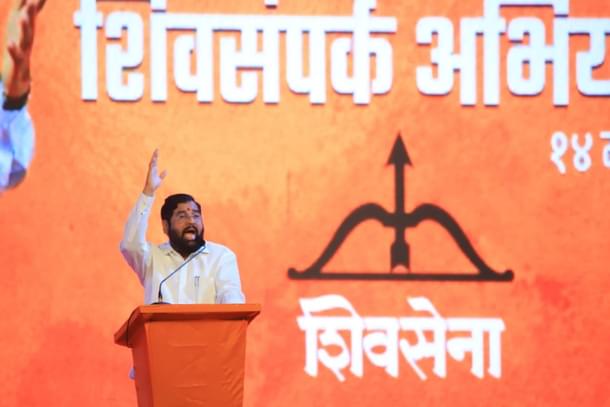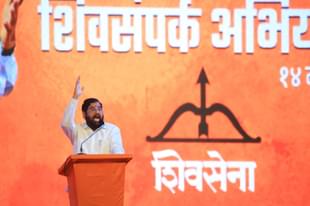Politics
From Leaders Switching Sides 'For The Sake Of Secularism', To A State Government On Verge Of Collapse For 'Not Being Hindutva Enough'
Aravindan Neelakandan
Jun 23, 2022, 04:57 PM | Updated 04:57 PM IST
Save & read from anywhere!
Bookmark stories for easy access on any device or the Swarajya app.


Jayaprakash Narayan (famously JP), was one of the tallest of the socialist leaders. He was not 'Establishment'. He was the eternal rebel, guide and philosopher of the socialists of utopian dreams.
Once, a middle-aged person approached and asked him to visit an RSS camp. JP flared up 'Do you know what you are talking, and to whom ?'
The other person was persistent. Has not JP fought all his years against untouchability? And if he is not seeing the RSS for himself, is he not committing the same sin of untouchability in a different way?
Half-convinced and with half-heartedly, JP visited the RSS camp and came out much impressed. He was not comfortable with that flag, that Maratha flag, but he was impressed by their love for the nation, their discipline, their selfless dedication for the motherland. But that flag he could not accept.
The man who made him visit the camp was wondering if he should ask what was wrong with Maratha empire that fought against Islamist imperialism in India but then he thought the better of it and left it there.
Later, Sitaram Goel (1921-2003) would reminisce about the incident in his book Perversion of India's Political Parlance, published first in 1984.
Sitaram Goel records his thoughts on the reaction of JP to the RSS:
J. P. had at last visited an RSS camp. He had been positively impressed by the quality of the workers whom the RSS had mobilized in the service of the nation. And yet he had retained his earlier reservations about the RSS. He could not visualise that the RSS was not a miracle which had materialized out of the blue. He could not see that there must be something in a society and a culture and historical tradition which had created such a splendid band of selfless workers without the benefit of any patronage from the powers that be and in the face of much malicious propaganda in the national and international press.
JP was a sincere lover of the nation. Hence he was able to overcome the prejudice. Further, secularism in itself as understood by a generation of patriotic politicians -from Sardar Patel to JP- is a genuine fundamental principle of any civil society and vibrant democracy. Yet, there was a problem.
The problem was a civilisational wound. And any wound left unhealed creates bitter and uglier problems.
India soon saw a degeneration. Again Sitaram Goel:
To my mind the key to an understanding of the whole situation is to be found in the political parlance which has been prevalent in this country for more than five decades. Over the years, this parlance has been parodying the RSS as a "rightist, reactionary and revivalist movement of militant Hindu communalism." Over the years this parlance has been pillorying Hindu society as a "crowd of caste-ridden, cow-worshipping and superstitious primitives." Over the years, this parlance has been regarding Hindu culture as a "close preserve of obnoxious obscurantism."
Unattended wounds also provide the best habitat for all sorts of pathogens. Civilisational wounds create pathogens of vested interests of all sorts.
The year was 1998. Subramanian Swamy, through his own characteristic operations, brought down the Vajpayee government. Though personal enmity and disappointments related to ministerial berths seemed more the real cause, Dr. Swamy could be seen with a sadistic smile telling the press how a 'fascist anti-secular government' had been brought down and how India would walk into the twenty first century with a strong secular administration.
The late Cho Ramaswamy once wrote a painful, sarcastic spoof during the time of the Vajpayee government on how he was getting threatened by 'secular' allies. A municipal level party official of a secular party phones the PM and demands that he sends a letter of recommendation for LKG admission of his grandchild and threatens that if he fails to do that then he may have to reconsider his support to such a 'communal, anti-secular' BJP-led government.
The year was 2013. The political air was bustling with talks of Narendra Modi being announced as the prime ministerial candidate of the BJP. One of the first major voices of dissent was that of Nitish Kumar of Bihar. Modi could not be accepted he said. Because Modi was not a 'secular' face. Modi was to Nitish a Hindutva icon and hence not acceptable as a prime ministerial candidate.
From the genuine love for secularism that JP had to Nitish Kumar's hidden prime ministerial ambitions expressed as love for secularism, the equation has been simple - 'Hindutva is bad and anything against Hindutva is secularism'.
This is the power of the perverted political parlance. And it was having monopoly over the entire political discourse. Besides, the language of this perversion has always been the language of imperialism, pointed out the ever penetrating intelligence of Sitaram Goel. He wrote:
A close scrutiny of the Leftist language shows that it has an affinity with the languages used earlier by Islamic, Christian and British imperialism. That should surprise no one. The language of imperialism is the same in all ages and everywhere. India has been able to save herself from total subversion so far only because the spirit of nationalism has surfaced again and again. But that spirit cannot serve for long unless it evolves and speaks in its own language.
So, in every political opportunist drama that had happened in this country one sees this 'secularism' as the last refuge of political dishonesty and the word 'Hindutva' being its bugbear.
This is what makes the present political drama in Maharashtra important, irrespective of its outcome. Today the political future of a state government is facing imminent doom because the government is supposedly not Hindutva enough.
This is the single most important transformation that one needs to notice irrespective of what happens to Uddhav Thackeray government. 'You have to prove that you rule by the core principles and values of Hindutva. You have to prove that you have not compromised on your Hindutva. Otherwise, your political future will be in danger'.
So the old establishment monopoly of political parlance is over. There will be politicians who may resort to rhetoric, opportunism and horse-trading. There will be politicians who will also be honest and act with ideological commitment and patriotism. But unethical politicians cannot hide behind the fig leaf of 'saving secularism'.
Hindutva is as much a legitimate worldview as Nehruvian secularism. In fact, it has even more civilisational legitimacy than Nehruvian secularism which has reached its degenerate worse.
Now that 'secularism' can no longer be used as a magic pill to justify any shameless opportunism, politics becomes an ethically neutral playing field. You cannot topple governments for ministerial berth disappointments and then wear that as a badge of honour because the toppled government is a BJP government. You cannot align with BJP and then backstab it and grin with pride as if you are heaven-sent defender of secularism.
Those days are over, thanks to Hindutva ascent in the country.
Aravindan is a contributing editor at Swarajya.





